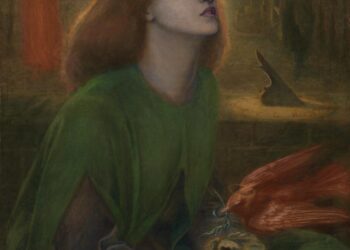On the night of April 3, 1919, President Woodrow Wilson began to suffer from a violent cough. His condition quickly worsened to the point that his personal doctor, Cary Grayson, thought the president might have been poisoned. Grayson later described the long night spent at Wilson’s bedside as “one of the worst through which I have ever passed. I was able to control the spasms of coughing but his condition looked very serious.”
The culprit wasn’t poison, but the same potent strain of influenza nicknamed the “Spanish flu” that would eventually kill an estimated 20 million worldwide, including more than 600,000 in the United States. Wilson’s illness was made even worse by its timing—the president was left bedridden in the middle of the most important negotiations of his life, the Paris Peace Conference to end World War I.
The 1918 “Spanish” flu was notorious for aggressively attacking the respiratory system. The infection was worst in the young and previously healthy, whose immune systems could overreact to the virus and drown the lungs with fluid, killing patients in a matter of days. But for those who survived the initial onslaught, some also experienced neurological symptoms.
Even after their burning fevers subsided, flu victims described “post-influenza manifestations,” psychotic delusions and visions that resulted from damage to the nervous system, says John Barry, author of The Great Influenza: The Story of the Deadliest Pandemic in History.
“The most comprehensive study of the 1918 pandemic noted how common neurological disorders were,” says Barry. “They were second only to the lung. This included psychosis, which was usually temporary.”
From numerous sources, it appears that Wilson suffered from similar effects during his fight with the flu at the Paris Peace Conference.
“He became paranoid,” says Barry. “Wilson thought the French had spies all around him. He was bizarrely obsessed with his furniture and his automobiles, and pretty much everyone around him noted it.” Wilson’s chief usher, a man named Irwin Hoover, wrote later that “something queer was happening in [the president’s] mind” and that “[o]ne thing is certain: he was never the same after this little spell of sickness.”
The British prime minister, Lloyd George, came to visit Wilson during his recuperation at the Hôtel du Prince Murat and labeled Wilson’s condition a “nervous and spiritual breakdown” in the middle of the heated Paris negotiations.
Although instances of “the psychoses of influenza” had been reported by physicians as early as the Russian Flu outbreak of 1889, there was no treatment for the condition, which usually went away on its own. One hypothesis is that the neurological disorder experienced by Wilson and others was caused by brain swelling (encephalitis) associated with the flu.
Source: The Great Influenza















